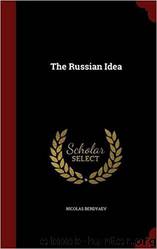The Russian Idea by Nicolas Berdyaev

Author:Nicolas Berdyaev [Berdyaev, Nicolas]
Language: eng
Format: epub
Publisher: The Macmillan Company
Published: 1948-09-14T23:00:00+00:00
CHAPTER VI
The question of the justification of culture. The distinction between culture and civilization. The inconsistency between a complete culture and the complete life. Simplification. Russian Nihilism. The ascetic eschatology and moralist elements in Nihilism. The cult of the natural sciences. Rejection of the significance of the relative. Pisarev. The contradiction betiveen the principle of personality and materialism. The liberation and the subjection of personality. Lavrov. Payment of the debt to the people. L. Tolstoy. The injustice of civilization and the justice of divine Nature. Leo Tolstoy and Rousseau. The meaning of non-resistance. The culture of the End
The theme of the justification of culture occupied a larger place in Russian thought than it did in the thought of the West. The people of the West rarely had any doubts about the justification of culture. They considered themselves the heirs of Mediterranean Greco-Roman culture and they were believers in the sanctity of its traditions. At the same time that culture presented itself to them as universal and unique while all the rest of the world was barbarian. This point of view was particularly clear-cut among the French. It is true that J.-J. Rousseau had doubts about the good of civilization. But that was the exception, almost a scandal, and the question was posed in another way than among the Russians. We shall see the difference in the case of Tolstoy. There was among the Russians none of that veneration of culture which is so characteristic of Western people. Dostoyevsky said we are all nihilists. I should say we Russians are either apocalyptists or nihilists. We are apocalyp-tists or nihilists because our energies are bent upon the end, and we have but a poor understanding of the gradualness of the historical process. We react against pure form. Spengler had this in view when he said that Russia is an apocalyptic revolt against antiquity, that is
to say against perfect form, perfect culture. 1 But Father George Florovsky's opinion that Russian nihilism was anti-historical utopianism is entirely mistaken. 2 Nihilism, belongs to the Russian historical destiny, as revolution does also. One must not recognize as historical only what pleases conservative taste. Revolt is also a historical phenomenon. It is one of the ways in which historical destiny is realized. The Russian cannot realize his historical destiny without revolt; that is the sort of people we are. Nihilism is a typically Russian phenomenon and it grew out of the spiritual soil of Orthodoxy. It contains the experience of a powerful element belonging to Orthodox asceticism. Orthodoxy, and especially Russian Orthodoxy, does not have its own justification of culture. There was in it a nihilistic element in relation to everything which man creates in this world. Roman Catholicism assimilated the ancient humanisms to itself. In Orthodoxy the expression of the eschatological side of Christianity was stronger than anything, and in Russian nihilism it is possible to distinguish ascetic and eschatological elements. The Russian people are a people of the end, and not of the intervening historical process, whereas humanistic culture does belong to the intervening historical process.
Download
This site does not store any files on its server. We only index and link to content provided by other sites. Please contact the content providers to delete copyright contents if any and email us, we'll remove relevant links or contents immediately.
| Africa | Americas |
| Arctic & Antarctica | Asia |
| Australia & Oceania | Europe |
| Middle East | Russia |
| United States | World |
| Ancient Civilizations | Military |
| Historical Study & Educational Resources |
Red Famine: Stalin's War on Ukraine by Anne Applebaum(2912)
Midnight in Chernobyl by Adam Higginbotham(2530)
Chernobyl by Serhii Plokhy(2524)
Midnight in Chernobyl: The Untold Story of the World's Greatest Nuclear Disaster by Adam Higginbotham(2211)
The House of Government by Slezkine Yuri(2188)
Red Shambhala by Andrei Znamenski(2177)
The Gulag Archipelago (Vintage Classics) by Aleksandr Solzhenitsyn(2075)
Red Notice by Bill Browder(2061)
All the Kremlin's Men by Mikhail Zygar(2058)
From Cold War to Hot Peace by Michael McFaul(2022)
Putin's Labyrinth(2011)
From Russia with Lunch by David Smiedt(1958)
The Future Is History by Masha Gessen(1892)
A People's Tragedy by Orlando Figes(1859)
The Romanovs by Simon Sebag Montefiore(1812)
How to Tame a Fox (and Build a Dog): Visionary Scientists and a Siberian Tale of Jump-Started Evolution by Lee Alan Dugatkin & Lyudmila Trut(1758)
The Lost Spy by Andrew Meier(1739)
Putin's Labyrinth: Spies, Murder, and the Dark Heart of the New Russia(1737)
Art and Revolution by John Berger(1711)
